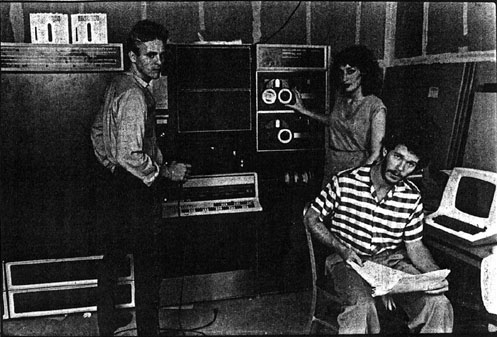|
u
n i t s
|

Photo: Chester Simpson
by Michael Snyder
"Most people consider synthesizers
and the musicians who play them to be cold and emotionless. The Units
want to change that attitude." Scott Ryser, founder of the San Francisco-based
band, waved his chopsticks to emphasize the point. Ryser and- his fellow Units Rachel Webber and Brad Saunders were finishing off an order of Kun Pao Chicken at a favorite Szechuan restaurant to celebrate the success of their tour through the American Southwest. That series of club dates in Nevada, Arizona and Southern California followed the release of their debut album on 415 Records, Digital Stimulation. The Units have begun to enlarge their audience beyond the SF Bay Area after two and a half years of hard work on stage and in the studio. Their achievements are especially surprising when you learn the trio's instrumentation is totally electronic, except for Saunder's drum kit. Not a guitar or saxophone in earshot. "My intention was to have a synthesizer band-that rocked out," said Ryser, who sings while providing melodies and rhythm patterns on a variety of keyboards. "Other groups with lineups similar to ours get lost in spacey metaphysical noise and pretension. The musicians try to imitate guitars or take long, dull synthesizer solos. I don't care if it's Switched-On Bach or robot-disco like Gary Numan. All that stuff lacks soul. Even though synthesizers are machines, we want our blend of sounds to be emotional, not mechanical." Tapping his chopsticks on the edge of a. teacup, Saunders joined the conversation. "Why create a wasteland?" he asked. "We might want to depict alienation, but we don't want to foster it. We prefer passion." The percussionist, bearded and intense, began his collaboration with Ryser in their hometown, Redding, CA, during 1976. Wanderlust struck Saunders and he ended up traveling to West Africa And Spain for a while. I went to Ghana to study music. On arriving there, I discovered that Ghana was in a state of political and economic chaos, but I was able to connect with a Dagomba master drummer for lessons. Oddly enough, the majority of my ethnic training came studying under Kwaku Dadey and George Marsh, both of whom teach and perform in the SF area. Spain was nothing but disco music. That's probably what drove me home to become one of the Units." Scott had put together the first lineup of the Units when Brad was out of the country. That group didn't last. Upon Brad's re turn from Spain they began rehearsing with Rachel, who added vocals and bass synthesizer to the mix. "Rachel and I met at the Mabuhay [S.F. club] two years ago," explained Scott, as Rachel looked up from grappling with her egg roll and smiled. "I was singing with another band, the Mummers & the Poppers, and I was having too much fun, so I joined the Units," said Rachel, eyes wide with innocence. As if on cue, Scott and Brad groaned. "Seriously," she continued, "Scott and I saw the Units as a chance to combine our interests in the visual arts with our music." Indeed, a typical Units gig includes all manner of projections and films that flash to the beat throughout the entire set. "I was making films before I got involved with music and my work was shown at theaters around town," Scott interjected. "The early movies had actors and plots. Then I got into film collages which lent themselves to fast-paced music. I chose to create my own soundtracks. Later, the films became integral parts of our live shows. Rachel has a degree in video art and we wanted to add something extra to make each performance more of an audiovisual event." "We try to make our songs visual, too," said Brad. "Not just in the lyrical content, but in the melodies and rhythms used. They can come from sources as diverse as Latin and African music, or even architectural structures. We've translated visual rhythm, the patterns in a building's facade, into scores. You can actually develop polyrhythms based on the horizontal organization of, for example, windows or ornamentation." "There are also classical influences," Rachel added, "like the rhythm line in one of our songs which we adapted from Stravinsky's 'Rite of Spring.' On the other hand, you have a number like 'The Mission Is Bitchin',' which is pure fun. It was inspired by the fact that Scott and I live across from Mission High School, and we've had a steady diet of burritos and low-riders. 'Mission' is our tribute to the barrio." [Ed. note: the Mission district of San Francisco is predominantly Hispanic and like Boston's Mission Hill has recently become a mecca for local musicians.] Scott broke open a fortune cookie with no fortune inside and laughed. "I hope everyone forgets the preconceived notion that synthesizer bands are tortured intellectuals," he said. "We're into this for the fun, not angst. I'd rather listen to Iggy Pop, Aretha Franklin or James Brown than Tangerine Dream. We've played toga parties in Las Vegas and juke joints in Tuscan Those cowboys get as excited about our music as our fans in San Francisco. "We never want to be dominated by the machines we use," agreed Rachel. "The title cut on Digital Stimulation is about a person who can't find gratification from human relationships because he's overcome by technology. Hopefully, that will never happen to the Units." |
The Units from San Francisco will be in
Boston with their unique audio/video
presentation for a date at the Underground
Saturday, April 18.